ACC3004 Taxation Law: Case Studies on Australian Tax Law & Regulations
VerifiedAdded on 2023/03/31
|6
|854
|56
Case Study
AI Summary
This assignment presents solutions to taxation law case studies, focusing on Australian tax regulations. It addresses residency tests, including the resides test, domicile test, 183-day test, and commonwealth superannuation fund criteria, to determine tax liabilities for individuals like Sinclair. The analysis extends to income earned overseas and its tax implications under Section 23AG ITAA 1936. Additionally, the assignment examines the taxation of franked and unfranked dividends received by non-residents, such as Rosmarie, and their obligations to file tax returns in Australia. Desklib provides students with access to similar solved assignments and past papers for comprehensive study support.
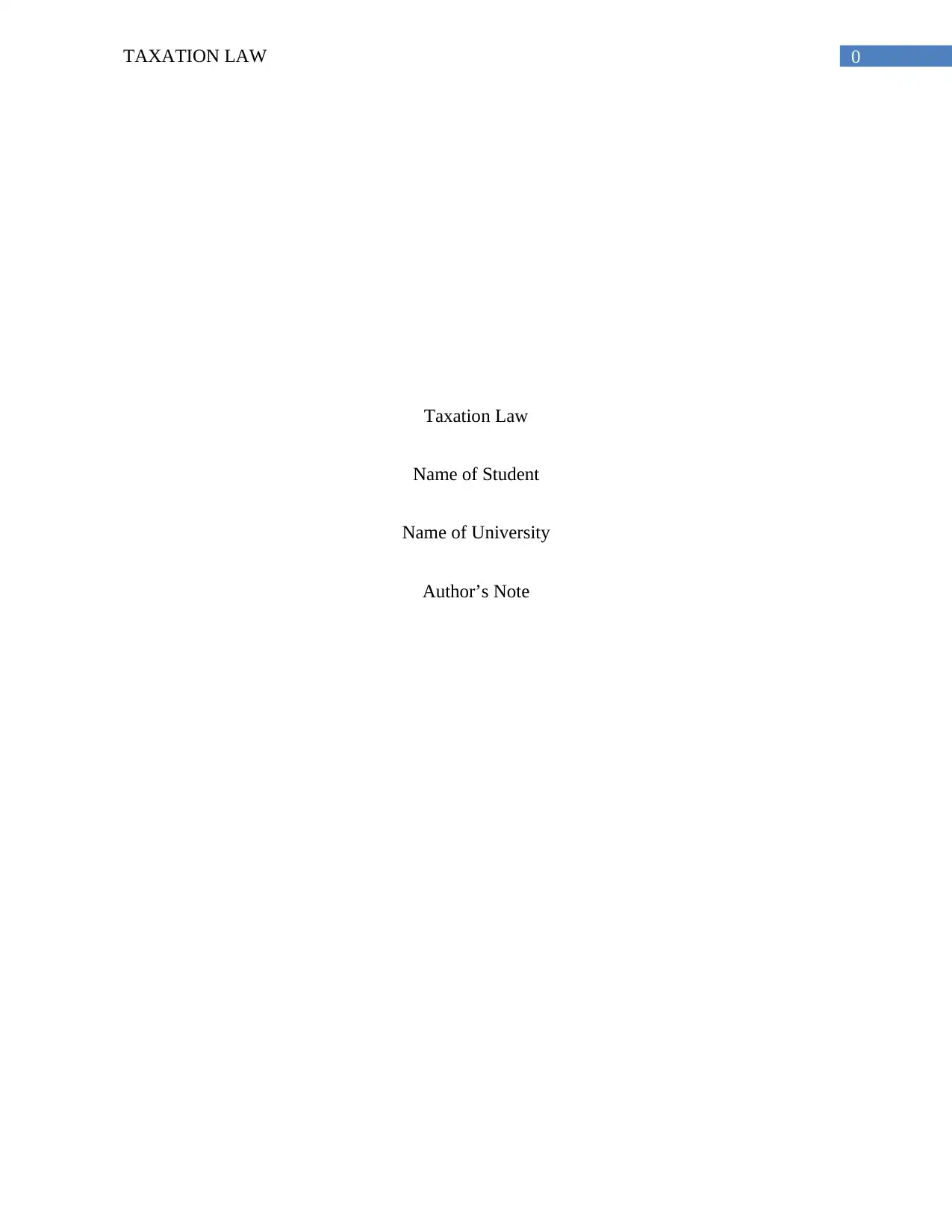
0TAXATION LAW
Taxation Law
Name of Student
Name of University
Author’s Note
Taxation Law
Name of Student
Name of University
Author’s Note
Paraphrase This Document
Need a fresh take? Get an instant paraphrase of this document with our AI Paraphraser
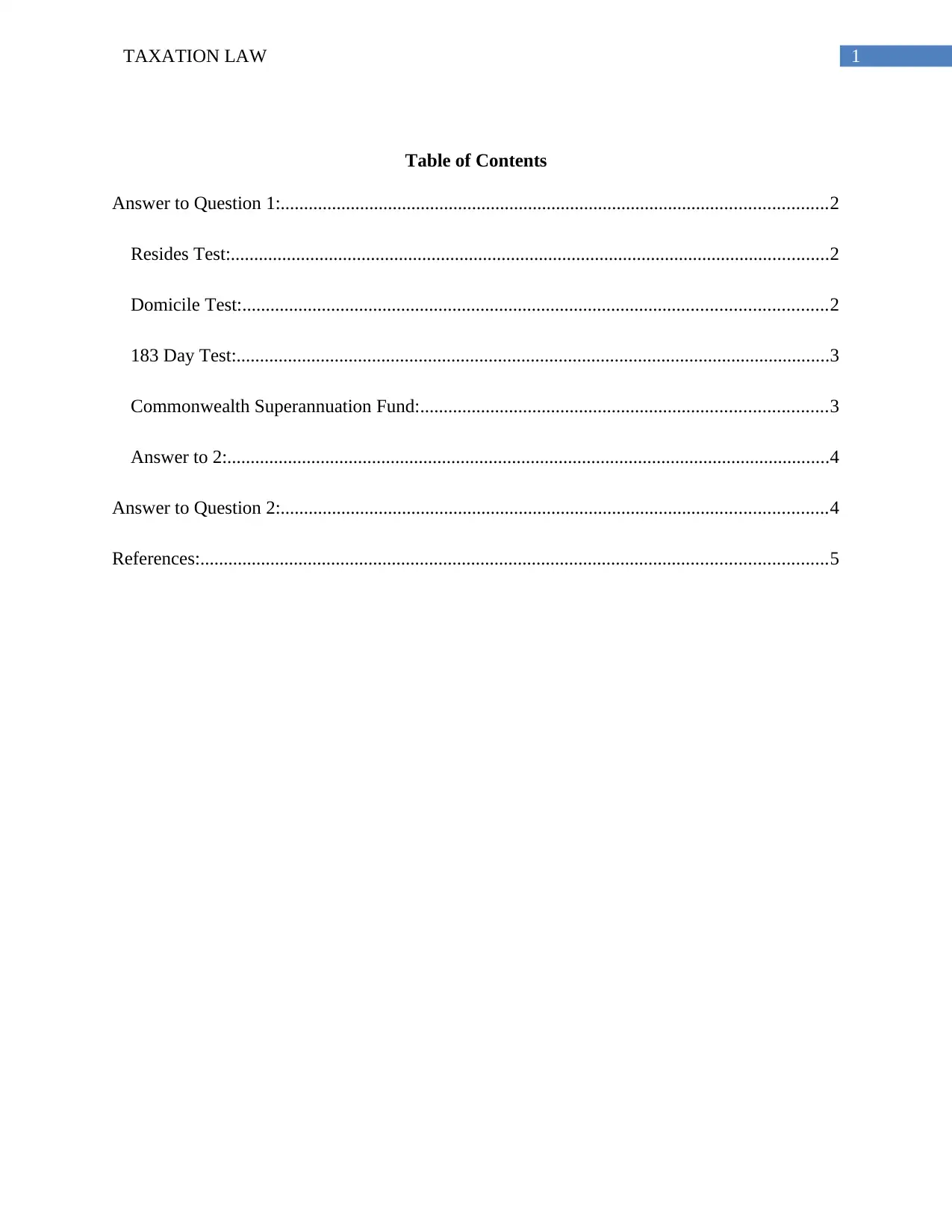
1TAXATION LAW
Table of Contents
Answer to Question 1:.....................................................................................................................2
Resides Test:................................................................................................................................2
Domicile Test:.............................................................................................................................2
183 Day Test:...............................................................................................................................3
Commonwealth Superannuation Fund:.......................................................................................3
Answer to 2:.................................................................................................................................4
Answer to Question 2:.....................................................................................................................4
References:......................................................................................................................................5
Table of Contents
Answer to Question 1:.....................................................................................................................2
Resides Test:................................................................................................................................2
Domicile Test:.............................................................................................................................2
183 Day Test:...............................................................................................................................3
Commonwealth Superannuation Fund:.......................................................................................3
Answer to 2:.................................................................................................................................4
Answer to Question 2:.....................................................................................................................4
References:......................................................................................................................................5
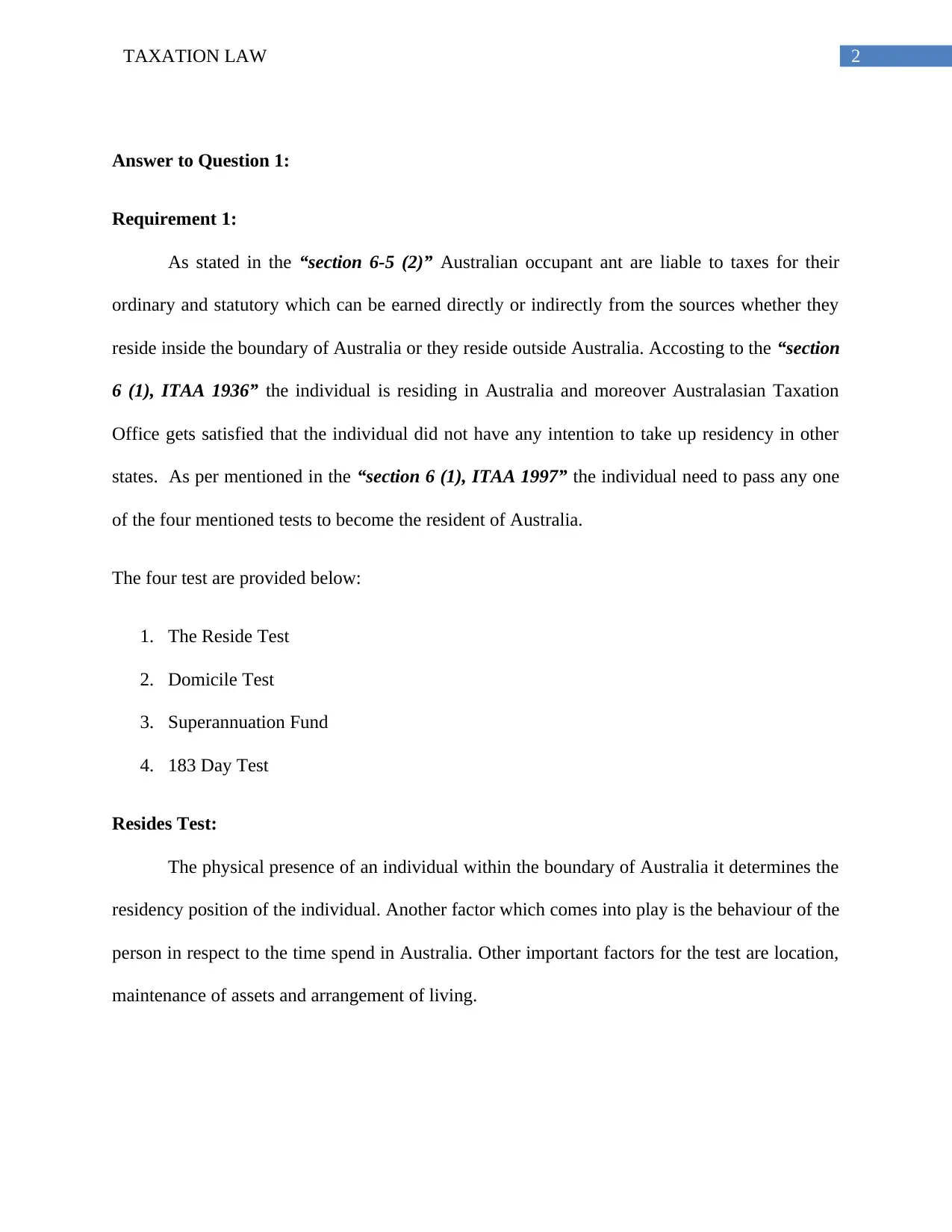
2TAXATION LAW
Answer to Question 1:
Requirement 1:
As stated in the “section 6-5 (2)” Australian occupant ant are liable to taxes for their
ordinary and statutory which can be earned directly or indirectly from the sources whether they
reside inside the boundary of Australia or they reside outside Australia. Accosting to the “section
6 (1), ITAA 1936” the individual is residing in Australia and moreover Australasian Taxation
Office gets satisfied that the individual did not have any intention to take up residency in other
states. As per mentioned in the “section 6 (1), ITAA 1997” the individual need to pass any one
of the four mentioned tests to become the resident of Australia.
The four test are provided below:
1. The Reside Test
2. Domicile Test
3. Superannuation Fund
4. 183 Day Test
Resides Test:
The physical presence of an individual within the boundary of Australia it determines the
residency position of the individual. Another factor which comes into play is the behaviour of the
person in respect to the time spend in Australia. Other important factors for the test are location,
maintenance of assets and arrangement of living.
Answer to Question 1:
Requirement 1:
As stated in the “section 6-5 (2)” Australian occupant ant are liable to taxes for their
ordinary and statutory which can be earned directly or indirectly from the sources whether they
reside inside the boundary of Australia or they reside outside Australia. Accosting to the “section
6 (1), ITAA 1936” the individual is residing in Australia and moreover Australasian Taxation
Office gets satisfied that the individual did not have any intention to take up residency in other
states. As per mentioned in the “section 6 (1), ITAA 1997” the individual need to pass any one
of the four mentioned tests to become the resident of Australia.
The four test are provided below:
1. The Reside Test
2. Domicile Test
3. Superannuation Fund
4. 183 Day Test
Resides Test:
The physical presence of an individual within the boundary of Australia it determines the
residency position of the individual. Another factor which comes into play is the behaviour of the
person in respect to the time spend in Australia. Other important factors for the test are location,
maintenance of assets and arrangement of living.
⊘ This is a preview!⊘
Do you want full access?
Subscribe today to unlock all pages.

Trusted by 1+ million students worldwide
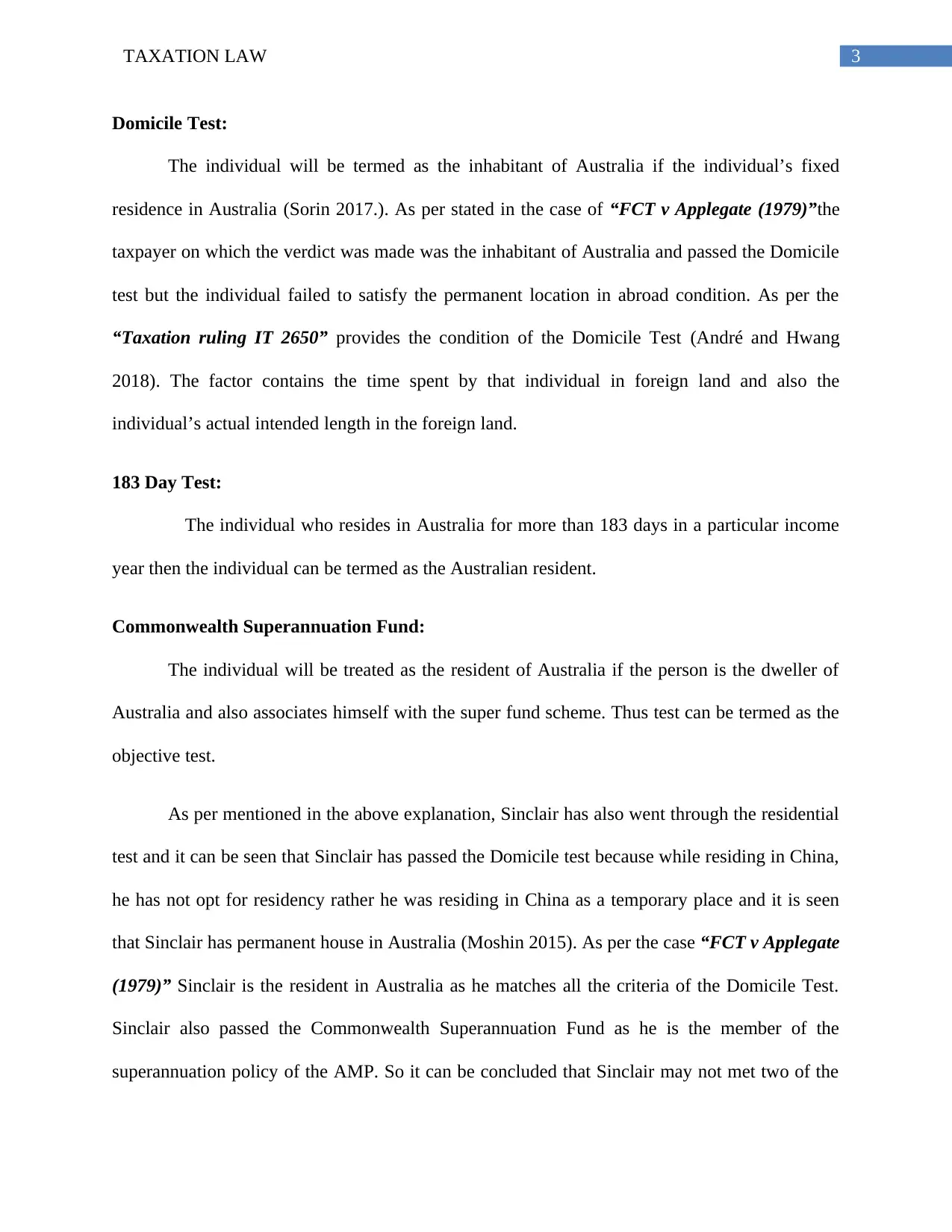
3TAXATION LAW
Domicile Test:
The individual will be termed as the inhabitant of Australia if the individual’s fixed
residence in Australia (Sorin 2017.). As per stated in the case of “FCT v Applegate (1979)”the
taxpayer on which the verdict was made was the inhabitant of Australia and passed the Domicile
test but the individual failed to satisfy the permanent location in abroad condition. As per the
“Taxation ruling IT 2650” provides the condition of the Domicile Test (André and Hwang
2018). The factor contains the time spent by that individual in foreign land and also the
individual’s actual intended length in the foreign land.
183 Day Test:
The individual who resides in Australia for more than 183 days in a particular income
year then the individual can be termed as the Australian resident.
Commonwealth Superannuation Fund:
The individual will be treated as the resident of Australia if the person is the dweller of
Australia and also associates himself with the super fund scheme. Thus test can be termed as the
objective test.
As per mentioned in the above explanation, Sinclair has also went through the residential
test and it can be seen that Sinclair has passed the Domicile test because while residing in China,
he has not opt for residency rather he was residing in China as a temporary place and it is seen
that Sinclair has permanent house in Australia (Moshin 2015). As per the case “FCT v Applegate
(1979)” Sinclair is the resident in Australia as he matches all the criteria of the Domicile Test.
Sinclair also passed the Commonwealth Superannuation Fund as he is the member of the
superannuation policy of the AMP. So it can be concluded that Sinclair may not met two of the
Domicile Test:
The individual will be termed as the inhabitant of Australia if the individual’s fixed
residence in Australia (Sorin 2017.). As per stated in the case of “FCT v Applegate (1979)”the
taxpayer on which the verdict was made was the inhabitant of Australia and passed the Domicile
test but the individual failed to satisfy the permanent location in abroad condition. As per the
“Taxation ruling IT 2650” provides the condition of the Domicile Test (André and Hwang
2018). The factor contains the time spent by that individual in foreign land and also the
individual’s actual intended length in the foreign land.
183 Day Test:
The individual who resides in Australia for more than 183 days in a particular income
year then the individual can be termed as the Australian resident.
Commonwealth Superannuation Fund:
The individual will be treated as the resident of Australia if the person is the dweller of
Australia and also associates himself with the super fund scheme. Thus test can be termed as the
objective test.
As per mentioned in the above explanation, Sinclair has also went through the residential
test and it can be seen that Sinclair has passed the Domicile test because while residing in China,
he has not opt for residency rather he was residing in China as a temporary place and it is seen
that Sinclair has permanent house in Australia (Moshin 2015). As per the case “FCT v Applegate
(1979)” Sinclair is the resident in Australia as he matches all the criteria of the Domicile Test.
Sinclair also passed the Commonwealth Superannuation Fund as he is the member of the
superannuation policy of the AMP. So it can be concluded that Sinclair may not met two of the
Paraphrase This Document
Need a fresh take? Get an instant paraphrase of this document with our AI Paraphraser
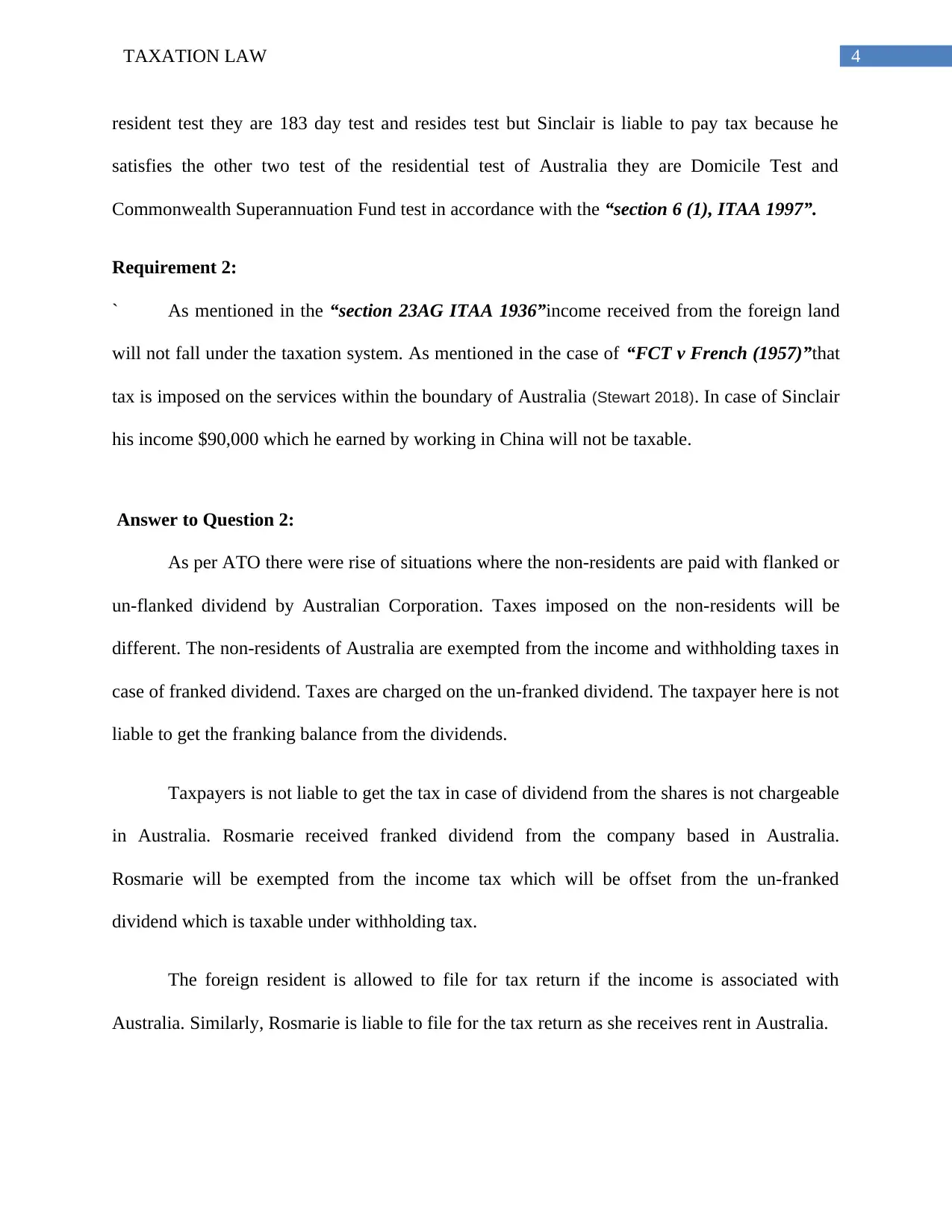
4TAXATION LAW
resident test they are 183 day test and resides test but Sinclair is liable to pay tax because he
satisfies the other two test of the residential test of Australia they are Domicile Test and
Commonwealth Superannuation Fund test in accordance with the “section 6 (1), ITAA 1997”.
Requirement 2:
` As mentioned in the “section 23AG ITAA 1936”income received from the foreign land
will not fall under the taxation system. As mentioned in the case of “FCT v French (1957)”that
tax is imposed on the services within the boundary of Australia (Stewart 2018). In case of Sinclair
his income $90,000 which he earned by working in China will not be taxable.
Answer to Question 2:
As per ATO there were rise of situations where the non-residents are paid with flanked or
un-flanked dividend by Australian Corporation. Taxes imposed on the non-residents will be
different. The non-residents of Australia are exempted from the income and withholding taxes in
case of franked dividend. Taxes are charged on the un-franked dividend. The taxpayer here is not
liable to get the franking balance from the dividends.
Taxpayers is not liable to get the tax in case of dividend from the shares is not chargeable
in Australia. Rosmarie received franked dividend from the company based in Australia.
Rosmarie will be exempted from the income tax which will be offset from the un-franked
dividend which is taxable under withholding tax.
The foreign resident is allowed to file for tax return if the income is associated with
Australia. Similarly, Rosmarie is liable to file for the tax return as she receives rent in Australia.
resident test they are 183 day test and resides test but Sinclair is liable to pay tax because he
satisfies the other two test of the residential test of Australia they are Domicile Test and
Commonwealth Superannuation Fund test in accordance with the “section 6 (1), ITAA 1997”.
Requirement 2:
` As mentioned in the “section 23AG ITAA 1936”income received from the foreign land
will not fall under the taxation system. As mentioned in the case of “FCT v French (1957)”that
tax is imposed on the services within the boundary of Australia (Stewart 2018). In case of Sinclair
his income $90,000 which he earned by working in China will not be taxable.
Answer to Question 2:
As per ATO there were rise of situations where the non-residents are paid with flanked or
un-flanked dividend by Australian Corporation. Taxes imposed on the non-residents will be
different. The non-residents of Australia are exempted from the income and withholding taxes in
case of franked dividend. Taxes are charged on the un-franked dividend. The taxpayer here is not
liable to get the franking balance from the dividends.
Taxpayers is not liable to get the tax in case of dividend from the shares is not chargeable
in Australia. Rosmarie received franked dividend from the company based in Australia.
Rosmarie will be exempted from the income tax which will be offset from the un-franked
dividend which is taxable under withholding tax.
The foreign resident is allowed to file for tax return if the income is associated with
Australia. Similarly, Rosmarie is liable to file for the tax return as she receives rent in Australia.
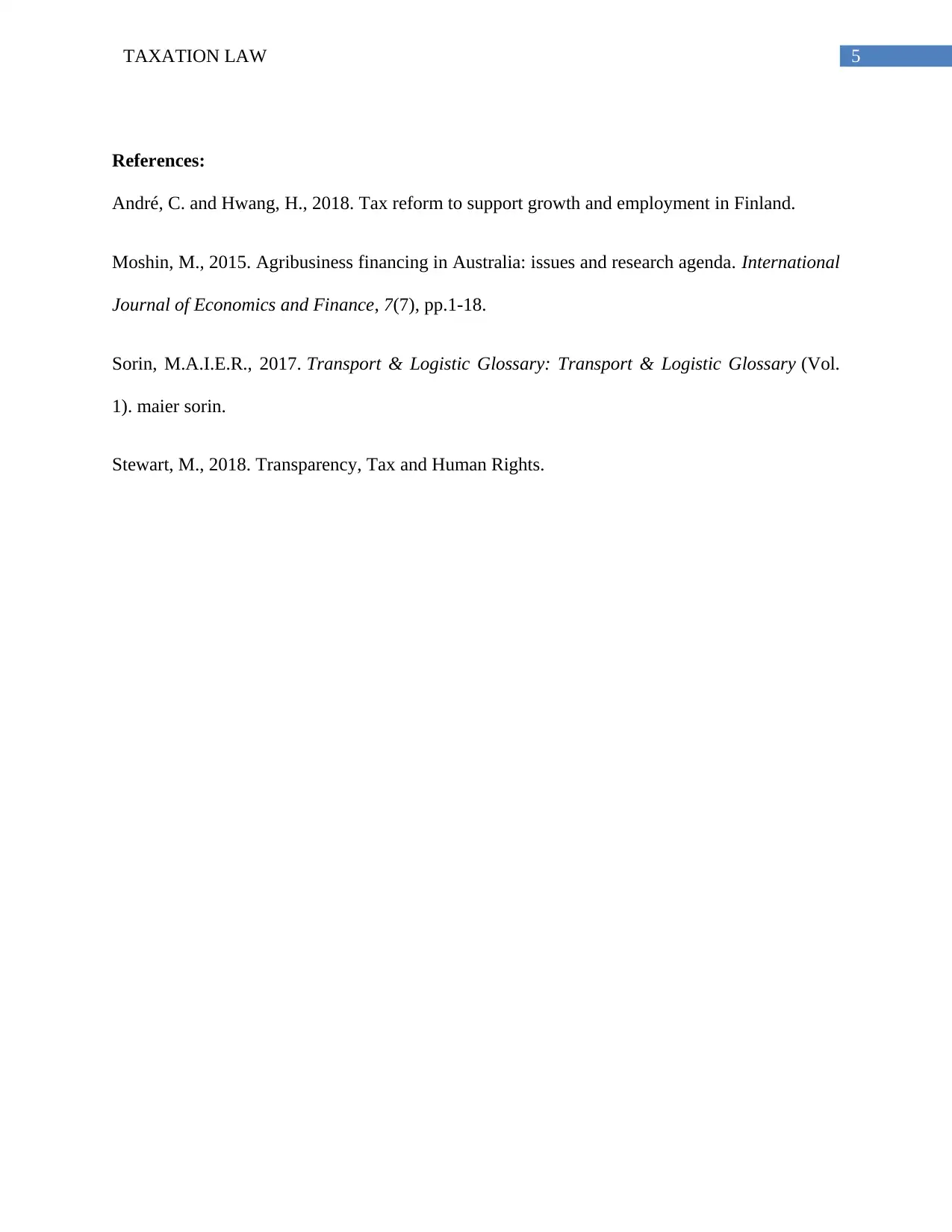
5TAXATION LAW
References:
André, C. and Hwang, H., 2018. Tax reform to support growth and employment in Finland.
Moshin, M., 2015. Agribusiness financing in Australia: issues and research agenda. International
Journal of Economics and Finance, 7(7), pp.1-18.
Sorin, M.A.I.E.R., 2017. Transport & Logistic Glossary: Transport & Logistic Glossary (Vol.
1). maier sorin.
Stewart, M., 2018. Transparency, Tax and Human Rights.
References:
André, C. and Hwang, H., 2018. Tax reform to support growth and employment in Finland.
Moshin, M., 2015. Agribusiness financing in Australia: issues and research agenda. International
Journal of Economics and Finance, 7(7), pp.1-18.
Sorin, M.A.I.E.R., 2017. Transport & Logistic Glossary: Transport & Logistic Glossary (Vol.
1). maier sorin.
Stewart, M., 2018. Transparency, Tax and Human Rights.
⊘ This is a preview!⊘
Do you want full access?
Subscribe today to unlock all pages.

Trusted by 1+ million students worldwide
1 out of 6
Related Documents
Your All-in-One AI-Powered Toolkit for Academic Success.
+13062052269
info@desklib.com
Available 24*7 on WhatsApp / Email
![[object Object]](/_next/static/media/star-bottom.7253800d.svg)
Unlock your academic potential
Copyright © 2020–2026 A2Z Services. All Rights Reserved. Developed and managed by ZUCOL.





